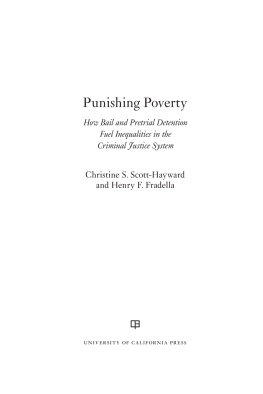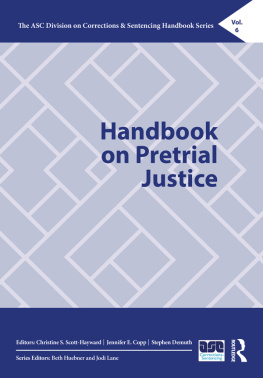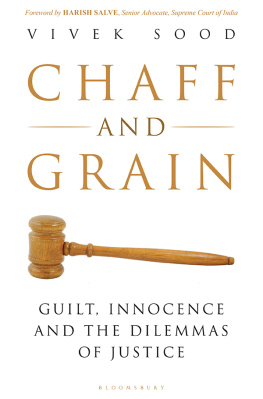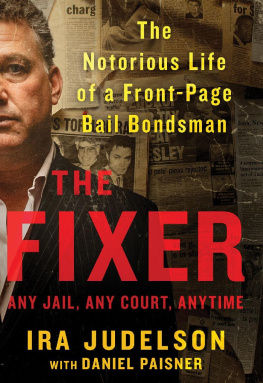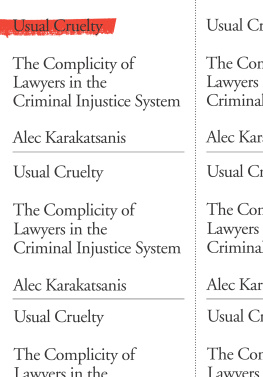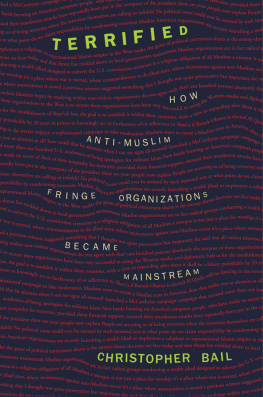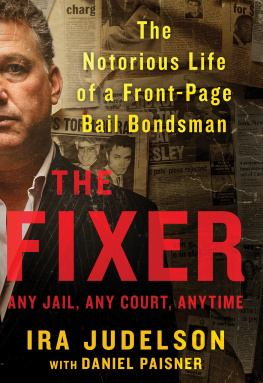Punishing Poverty
Punishing Poverty
How Bail and Pretrial Detention Fuel Inequalities in the Criminal Justice System
Christine S. Scott-Hayward and Henry F. Fradella

UNIVERSITY OF CALIFORNIA PRESS
University of California Press, one of the most distinguished university presses in the United States, enriches lives around the world by advancing scholarship in the humanities, social sciences, and natural sciences. Its activities are supported by the UC Press Foundation and by philanthropic contributions from individuals and institutions. For more information, visit www.ucpress.edu.
University of California Press
Oakland, California
2019 by Christine S. Scott-Hayward and Henry F. Fradella
Library of Congress Cataloging-in-Publication Data
Names: Scott-Hayward, Christine S., author. | Fradella, Henry F., author.
Title: Punishing poverty : how bail and pretrial detention fuel inequalities in the criminal justice system / Christine S. Scott-Hayward and Henry F. Fradella.
Description: Oakland, California : University of California Press, [2019] | Includes bibliographical references and index. |
Identifiers: LCCN 2019009255 (print) | LCCN 2019012445 (ebook) | ISBN 9780520970496 (e-book) | ISBN 9780520298309 (cloth : alk. paper) | ISBN 9780520298316 (pbk. : alk. paper)
Subjects: LCSH : BailUnited States. | ArrestUnited States. | EqualityUnited States. | Criminal justice, Administration ofUnited States.
Classification: LCC KF 9632 (ebook) | LCC KF 9632 . S 36 2019 (print) | DDC 345.73/072dc23
LC record available at https://lccn.loc.gov/2019009255
Manufactured in the United States of America
27 26 25 24 23 22 21 20 19
10 9 8 7 6 5 4 3 2 1
Contents
Acknowledgments
We would like to express our thanks to some of the people who helped make this book a reality. Our editor, Maura Roessner, encouraged us from the start and patiently guided us through the writing and publication process. Thank you to her and all of the staff at UC Press. Thanks also to the anonymous reviewers who provided thoughtful and helpful feedback on both the proposal and manuscript.
Christine S. Scott-Hayward and
Henry F. Fradella
Id like to add my thanks to my colleague and friend Hank Fradella. I have long thought about writing a book about the injustices of the bail system, but without Hank, quite simply, it would not have happened. Hank has been my mentor and friend since he hired me at California State University, Long Beach, and words cannot express how much I value our relationship. Thank you for your patience and guidance throughout this project. I would also like to thank Sarah Ottone, a former graduate student at CSULB, now at Georgetown University Law Center. Sarah and I collaborated on a study of pretrial decision making in Southern California, and the research we conducted informs many of the arguments in this book. Finally, I thank my family, particularly my husband Mike and my children, James and Jack. You have listened to me rail about bail for years, and I dedicate this book to you. Thank you for your love and support.
Christine S. Scott-Hayward
CHAPTER ONE
The Origins and History of Bail in the Common Law Tradition
INTRODUCTION
In 1964 US attorney general Robert Kennedy testified before a subcommittee of the US Senate Judiciary Committee to advocate for legislation reforming the bail system in the United States. He began his remarks by saying that the rich man and the poor man do not receive equal justice in our courts. And in no area is this more evident than in the matter of bail. He illustrated this point with a number of poignant stories:
Recently, in Los Angeles, a man was forced to stay in jail awaiting trial for a minor crime because he could not afford bail. His case came to trial after 207 days. He was acquitted.
A Pennsylvania man who could not raise $300 spent 54 days in jail awaiting trial on a traffic offensethe maximum penalty for which was five days in jail.
In Glen Cove, New York, Daniel Walker was arrested on suspicion of robbery and spent 55 days in jail for want of bail. Meanwhile, he lost his job, his car was repossessed, his credit destroyed, and his wife had to move in with her parents. Later, he was found to be the victim of mistaken identity and released. But it took him four months simply to find another job.
Consider the stories of Derek West Harris, Kenneth Humphrey, and Kalief Browder.
Derek West Harris was a well-dressed and well-liked barber from Newark, New Jersey. He was pulled over for a minor traffic violation in May 2009. Police arrested the fifty-one-year-old for failing to register and insure his new car, as well for having several unpaid traffic tickets. Unable to pay the $1,000 bail set for him, West Harris was placed in a halfway house, where he was robbed and killed for the $3 he had in his pockets.
In May 2017, sixty-three-year-old Kenneth Humphrey was arrested and charged with robbery for going into his neighbors room in a senior citizens housing complex and allegedly stealing $5 and a bottle of cologne from that neighbor. Even though he posed no threat to society, he spent 250 days in the San Francisco County Jail because he could not afford to pay the $350,000 bail set in his case. As of the writing of this book, review by the California Supreme Court is pending.
Perhaps the most well-known case of injustice in the contemporary bail context is that of Kalief Browder. In October 2014 the New Yorker published an article by Jennifer Gonnerman that detailed the sad series of events that led to Browders suicide.man had just reported that they had robbed him. Browder denied the accusation and invited the officer to check his pockets. The search revealed nothing. The officer returned to his squad car to talk with the alleged victim, at which time the man changed his story and said that the two boys had not robbed him that night, but rather had stolen his backpack two weeks earlier.
Browder and his friend were taken into custody. Browder, who maintained that he had not committed the crime, was charged with robbery. Because he was already on probation for a previous joyriding offense, the judge ordered that Browder be held in custody unless he posted $3,000 bail. Because his family could not afford to post bail, the young man was taken to Rikers Island. More than two months passed before Browder next appeared in court. During that time a grand jury indicted him for the alleged robbery. He entered a plea of not guilty. But because Browder had been on probation at the time of the alleged offense, the judge remanded him into custody without bail.
As the weeks and months passed, Browder steadfastly refused to plead guilty, insisting on his innocence. This differentiates Browder from many pretrial detainees in the United States, who plead guilty to escape the conditions of their pretrial confinement. Individuals who insist on their innocence and refuse to plead guilty get held[,]... [b]ut the people who choose to plead guilty get out faster.
More than two years went by, during which more than a half dozen requests for continuances by the prosecution resulted in postponement after postponement of Browders trial date. During this time, Browder spent a significant amount of time in solitary confinement, largely as a result of minor infractions. He became depressed and twice attempted to commit suicide.
In the fall of 2012 prosecutors offered Browder a new plea deal. In exchange for a plea of guilty, he would be sentenced to two and one-half years in prison. Given the time he had already served, that meant Browder would be released in a matter of weeks. According to his court-appointed defense attorney, Ninety-nine out of a hundred would take In March 2013 a judge offered Browder a most tempting opportunity: plead guilty to two misdemeanor offenses in exchange for immediate release on time served. Browder refused yet again, asserting that he had not done anything wrong. Just over two months later, the judge dismissed the case against Browder.
Next page
